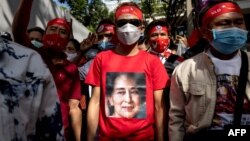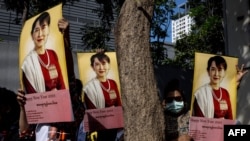The United Nations Security Council passed a landmark resolution on Myanmar Wednesday, demanding the military junta immediately end violence in the Southeast Asian nation and free all political prisoners, including ousted leader Aung San Suu Kyi and President Win Myint.
The resolution, the Council's first on Myanmar since the country formerly known as Burma became a member of the U.N. in April 1948, also asks the junta for immediate and concrete implementation of the Association of Southeast Asian Nations five-point consensus and respect for the democratic will of the people of Myanmar.
The resolution passed with 12 yes votes and three abstentions, from China, India and Russia.
The action was difficult to achieve, according to some members of the 15-member Security Council, because China and Russia, two permanent council members, have consistently opposed strong action over the Myanmar crisis.
"Today we've sent a firm message to the military that there should be no doubt — we expect this resolution to be implemented in full," British U.N. Ambassador Barbara Woodward told the council after the vote on the British-drafted resolution.
Woodward added that the resolution mandated the U.N. secretary-general to brief the council on the situation in Myanmar this spring. That "will be an important opportunity to assess developments on the ground and we stand ready to take further action as necessary."
"We've also sent a clear message to the people of Myanmar that we seek progress in line with their rights, their wishes, and their interests," the ambassador added.
U.S. Secretary of State Antony Blinken welcomed the resolution. In a written statement released Wednesday, Blinken said adoption of the resolution is an important step by the Security Council but added more needs to be done.
"While we applaud the adoption of this resolution, the Council still has much more work to do to advance a just solution to the crisis in Burma. The Security Council should leverage this opportunity to seek additional ways to promote a return to the path of democracy, advance accountability for the regime's actions, and support ASEAN's efforts to achieve meaningful implementation of the Five Point Consensus," he said.
Reading from a statement by the exiled Myanmar National unity government, Myanmar's U.N. ambassador, Kyaw Moe Tun, told reporters after the vote the resolution "demonstrated the Security Council's progress in taking action on the serious crisis in Myanmar and the junta's threat to international peace and security stability, despite the positive elements contained in the resolution and the challenges to adoption."
He added that he would have liked to have seen stronger language in the resolution.
China, which abstained from voting, wanted the Security Council to adopt a formal statement on Myanmar rather than a resolution.
"There was no quick fix to the Myanmar issue, let alone an external solution. Whether or not it can be properly resolved in the end depends fundamentally and only on Myanmar itself," China's U.N. ambassador, Zhang Jun, said after the vote.
Russia does not consider the Myanmar threat to merit Security Council consideration.
"Our position in principle is that the situation in Myanmar does not represent a threat to international peace and security," Russian U.N. Ambassador Vassily Nebenzia told the council after the vote.
Mark Farmaner, director of Burma Campaign UK, said the resolution should have included a prohibition on the supply of arms to the Myanmar military.
"Russia, China and India are using their seats on the Security Council to protect their profitable dodgy arms deals with the Burmese military," Farmaner said in a statement released after the UNSC vote.
Elaine Pearson, Asia director at Human Rights Watch, said in a statement, "The resolution should bring renewed scrutiny to the junta's daily atrocities and recognition of the Myanmar people's brave efforts toward democracy and freedom."
The resolution includes numerous references to the Association of Southeast Asian Nations, which adopted a five-point consensus in April 2021 in response to the Myanmar coup. It expresses deep concern at the "ongoing state of emergency" imposed by the military in Myanmar on February 1, 2021, and its grave impact on the people of Myanmar. The resolution also condemns the military's execution of pro-democracy activists.
Previously, the Security Council released a statement in July by its president calling for the immediate release of all arbitrarily detained prisoners, including Win Myint and Suu Kyi.






